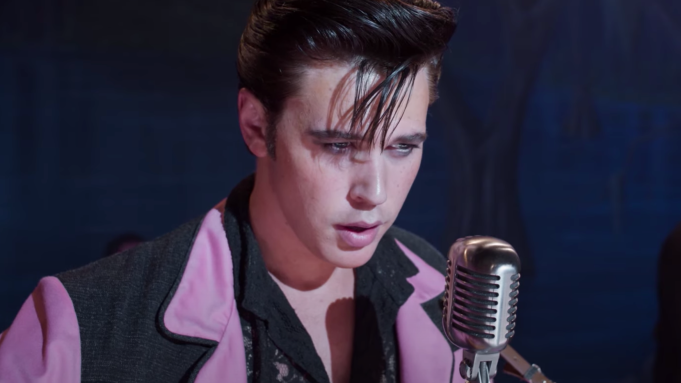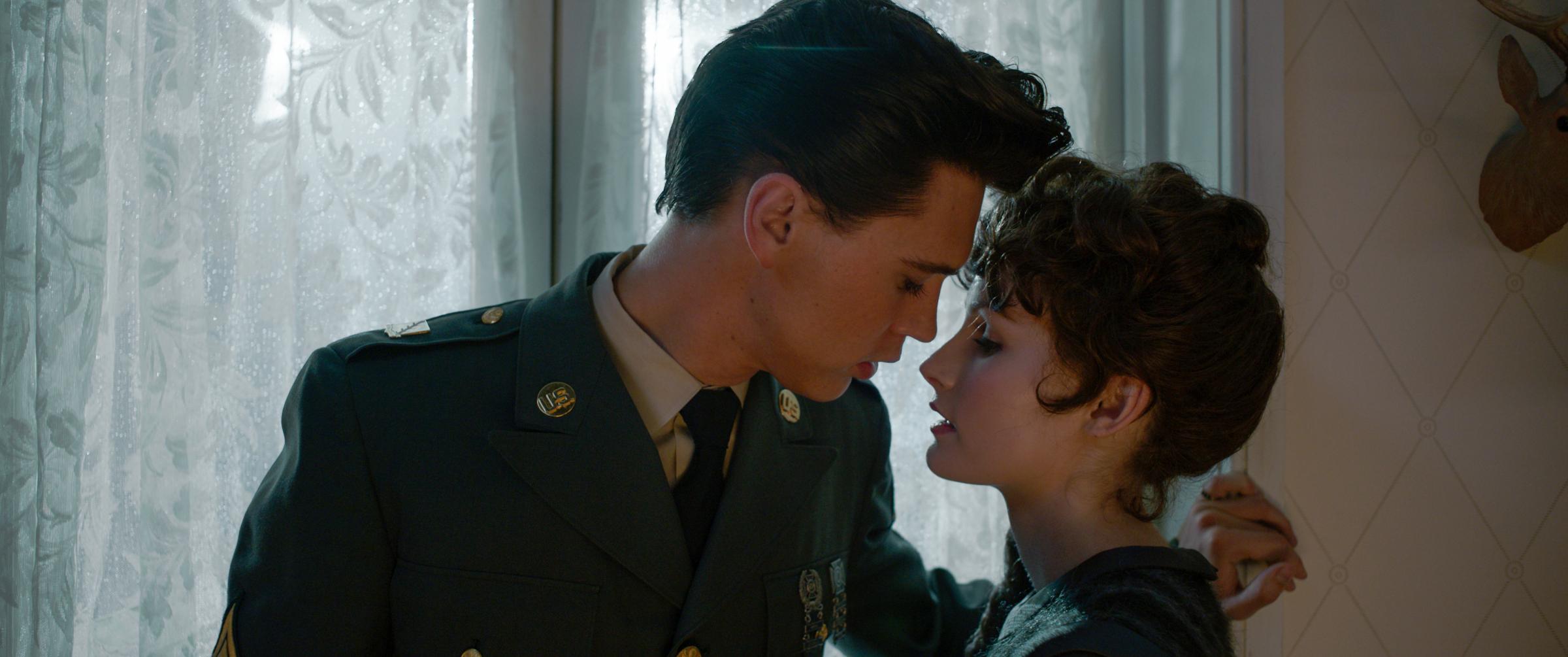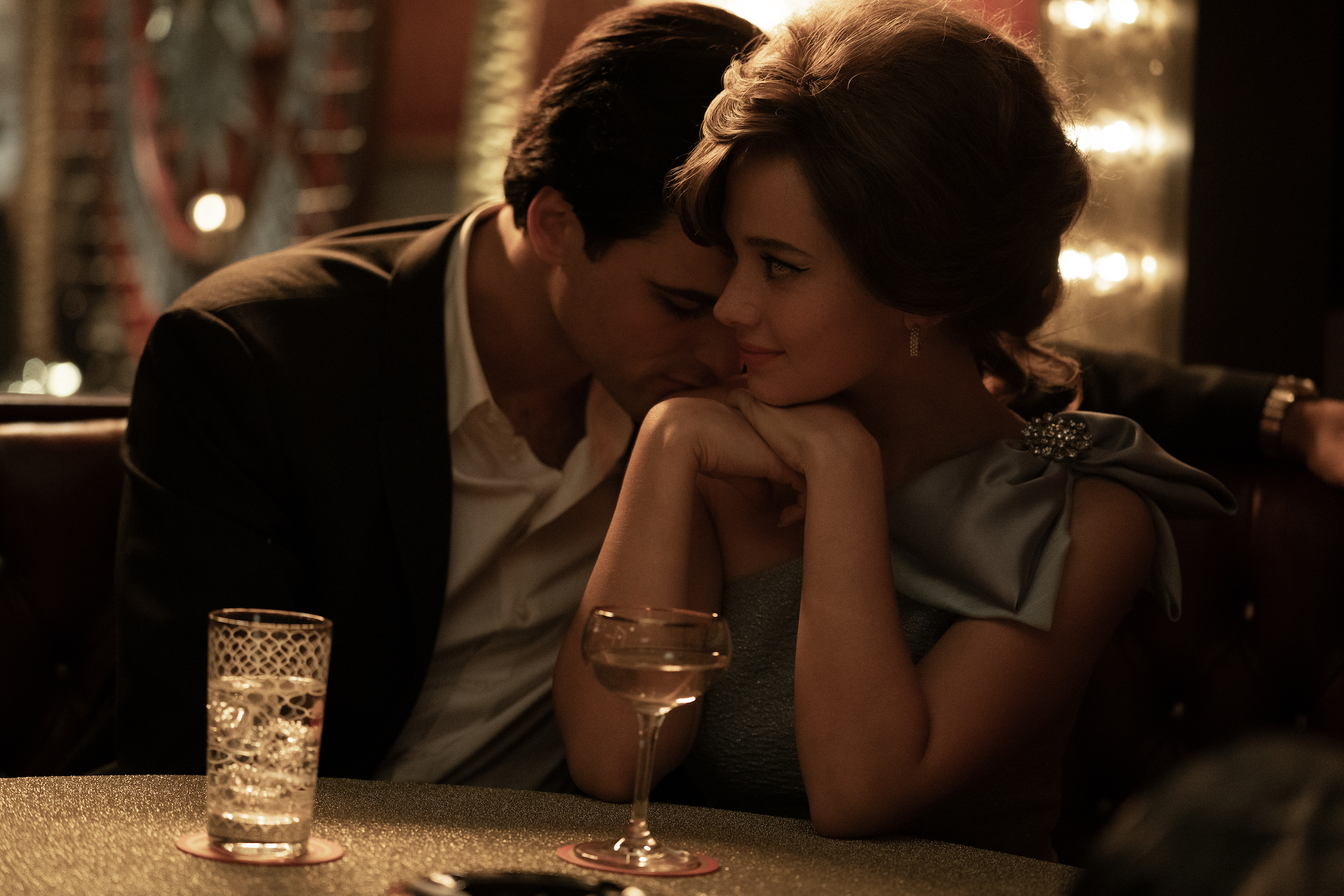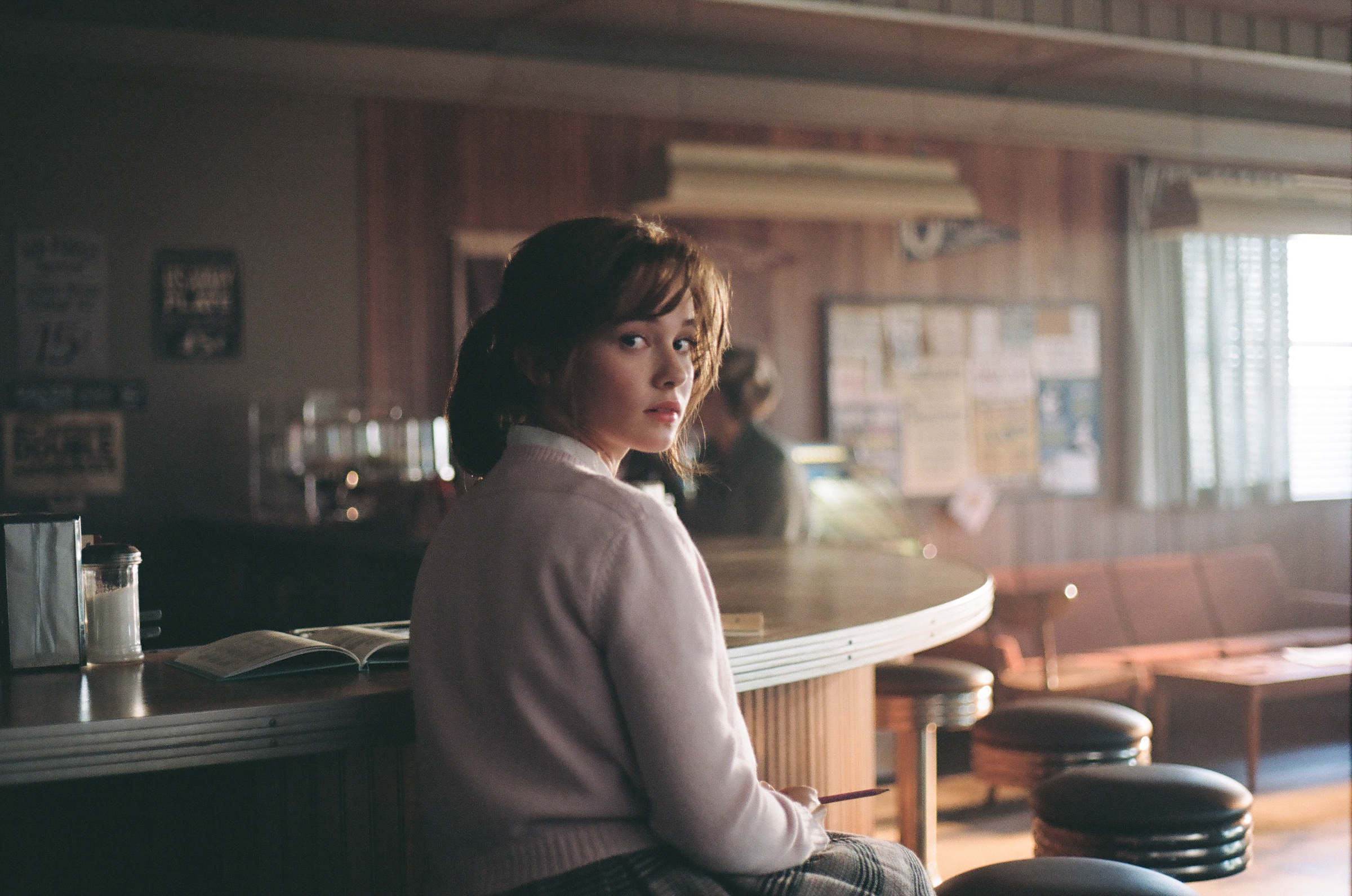For some of us, there’s no such thing as too much Elvis; for others, two Elvises within two years are two Elvises too many. Yet it’s surprising that it has taken until the first quarter of the 21st century for Elvis’ story to shimmer, in any significant way, onto the big screen. In 2022, Austin Butler was the alluring, ever-spinning center of Baz Luhrmann’s kaleidoscope dazzler Elvis. And with her new film Priscilla, Sofia Coppola puts the focus on the woman who became Elvis’ wife, Priscilla Beaulieu, played with extraordinary grace by Cailee Spaeny. Elvis, in this case, is a satellite, a servant to her story, and he’s played by Australian actor Jacob Elordi. Still, the essence of Elvis is in him. And in these very different characterizations, Butler and Elordi are strangely in tune, chiming together as they seek the truth behind a man who will always be a mystery.
With Priscilla, arriving roughly a year after Luhrmann’s Elvis, Coppola gives us—albeit unintentionally—a movie that’s like an answer song, one of those mid- to late-20th century phenomena in which one work calls out to another. Think of Joni Mitchell adding a dash of hope to Neil Young’s melancholic “Sugar Mountain” with “The Circle Game,” or the Beach Boys sending a love note to the Ronettes’ “Be My Baby” via the silken waves of “Don’t Worry Baby.” There have been plenty of other screen Elvises: John Carpenter’s made-for-TV Elvis arrived in 1979, just two years after the singer’s death; it’s as if Kurt Russell, in his wondrous and moving performance, had managed to harness some remnants of the King’s electricity, a stray bolt or two he’d left behind on his hasty departure from Earth. Other Elvises came later: a dream figure, half-glimpsed in a mirror, as played by Val Kilmer in 1993's True Romance; Michael Shannon as an outlandish pompadoured political oddity in the 2016 Elvis & Nixon. But Elordi and Butler together get much closer to what we know of Elvis the man, flaws and all. It’s as if these movies, one following so closely upon the other, form a cosmic confluence in which two Elvises can finally sing to each other.

In some ways, Butler’s Elvis has it easier. Through much of Luhrmann’s movie, he’s a swaggering god, grabbing at any opportunity tossed his way. In the beginning he’s an ambitious youth, strutting down the street, swinging a lunch box in one hand and a guitar in the other. The neighborhood kids stare at him, some jeer at him: who does he think he is, with his licorice-sheen coif, his practiced air of confidence? But there's a nervousness about him too, and in Elvis, we see him falling under the possessive sway of Colonel Tom Parker (played by Tom Hanks, whose unplaceable accent became the chief complaint about his performance, when it was really his greasy, calculating leer that made this characterization feel spiritually accurate). When Butler’s Elvis takes the stage in an early scene, shimmying before his audience in a drapey pink suit, he surveys the crowd with a mix of gratitude and greed. His glittering eyes tell the story: He can’t believe how much they love him, but he’ll take it all, thank you very much.
Read More: Baz Luhrmann's Elvis Is an Exhilarating, Maddening Spectacle—But One Made With Love
Butler’s Elvis, overall, is the more theatrical Elvis, the one who so lived for performance that he could barely tell where the performer left off and the person began. (That’s partly by design; Elvis is Elvis’s movie, designed to trace the arc of his half-meteoric, half-tragic career.) Even his relationship with Priscilla—who was 14 to his 24 at the time of their meeting—is presented as a meeting of shrewd equals. Played by Olivia DeJonge, the Priscilla of Elvis is a partner in crime, a smart young woman who could dish out as much as she could take: in Luhrmann’s vision, the two march arm in arm through a flashy Las Vegas montage, their faces lit up with winner-takes-all smiles.
But the Elvis of Elvis is also presented, rightly, as a victim in addition to a king. Parker drains him emotionally and bilks him financially, and Butler—his features nearly as baby-beautiful as those of the real Elvis, who had a soft-focus bloom about him—sails through parts of the movie with the air of a bruised monarch. His feelings run deep: after his mother Gladys’ death, he crumples to the floor of her closet, inhaling the scent still clinging to her clothes, though not even that gives him the strength to stand. One of Butler’s finest moments is the one in which Priscilla leaves Elvis, decisively, even though her heart is broken too. His voice bleary with the pills he’s been hooked on for years, he begs her not to go; as she walks out, he slumps on the carpeted stairs of Graceland and sobs, looking as fragile as a flower in his silk robe and bare feet. This is performance as body language; Butler shows us an Elvis folding in upon himself, a man who has given up his last hope of living in any version of the real world.

Both Elvis and Priscilla present a vision of Elvis framed by a third party, rather than one viewed directly, with the luxury of omniscience, by the person behind the camera. Luhrmann shapes Elvis’ story through the eyes of Parker, the man who helped make him and did more than his share to break him. And in Priscilla, Elvis, for once, isn’t the center of attention; it’s Priscilla’s experience that matters. The suggestion of both movies is that Elvis, like an eclipse of the sun, is too dazzling, too potentially disorienting, to be viewed without a filter.
Who was he, really? Coppola’s movie is based on Priscilla Presley’s 1985 memoir Elvis and Me (written with Sandra Harmon); it was made into a TV movie in 1988, but beyond that, Priscilla’s side of the Elvis story hasn’t been told onscreen. Spaeny’s performance, as the schoolgirl who fell for Elvis at 14 and left him at 27, is remarkable; she refuses to present Priscilla as a victim. She and Coppola allow even the very young Priscilla her dignity as a grownup-in-training. At one point, while Priscilla is still a teenager, fully under the sway of Elvis' charms, her mother suggests she might want to date some nice boys her own age. With a single disdainful glance, Spaeny’s Priscilla shoots that suggestion down like an ace marksman shattering a clay pigeon. She’s made up her mind; this is Elvis we’re talking about. There’s no going back.

The Elvis we meet in Priscilla is just about a year out from the grief-stricken one—the one who’d been curled into a defensive ball in his recently deceased mother’s closet—we saw in Elvis. He’s in the service, stationed in Germany; Priscilla, whose father is an officer in the Air Force, is stuck there too, having been whisked away from her friends back home in Texas. Priscilla is invited to a party at Elvis’ rented house; her parents, after some persuading, allow her to go. Elordi’s Elvis greets her—in her tasteful schoolgirl dress, her hair swept back in a simple ponytail—not in an appraising way but with a sense of wondrous curiosity. He asks her simple questions, ascertaining her age—and being surprised by it—when she tells him she’s in the ninth grade. A modern appraisal of the Elvis-and-Priscilla meeting might be to automatically assume he was sexually grooming her from the start, but that’s not how Elordi and Spaeny play it. Instead, their meeting is a kind of mutual spell spun of loneliness and dislocation. Elvis is still quivering with sorrow over the loss of his mother. Young Priscilla, smart, open-hearted, possessed of nascent wisdom that will eventually serve her well, warms to him—not just because he’s Elvis, but also because he’s a creature in need.
We see that sad, naked neediness in Elordi’s face. Later, we’ll see something else: how that genuine vulnerability could be used as a manipulation tactic, a handy scrim for his deceits. After Elvis has left the service and gone back to the States to build his movie career, Priscilla learns from the gossip pages that he’s been romancing his co-stars. She confronts him, at first by phone, and he stammers his excuses, thinly veiled lies that Priscilla accepts, even though we know she finds them unsatisfactory.
Read More: Elvis Still Has Not Left the Building
This is another truth of Elvis: in addition to being a deeply sensitive artist—and a deeply sensitive human being—he was a master manipulator, ruthless in his desire to arrange his life exactly as he wanted it to be. (The scene in which he persuades fresh, vibrant Priscilla to dye her hair black, to line her eyes with heavy makeup—to make her, essentially, look more like him—is tacitly chilling.) His behavior may have been exaggerated by excessive drug use, but it was also probably in his nature. Those who knew him often described him as guileless, generous, a person who was raised right by his mama. All of that is probably true, and Priscilla Presley, to this day, calls him the love of her life.

But Elordi’s performance, more than Butler’s, captures Elvis’ shadowy side, and his surprising capacity for clueless cruelty. The timeline of Priscilla coincides largely with a dip in Elvis’ popularity. When he returned from the service, he made movies he wasn’t happy with, and for a time, the Beatles’ rise would leave him in the dust. He would roar back, a phoenix decked out in black leather, in his 1968 comeback special, and would become a massive, jumpsuited draw in Vegas after that. But through much of Priscilla, Elvis is a disappointment to himself and to others. He’s a mess, and getting messier.
Read More: Sofia Coppola’s Priscilla Is Quietly Extraordinary
Elordi plays this Elvis quietly, with muted anguish; his suffering is the subterranean kind. Even when he’s present, he’s an absence. He speaks in a muted, often indecipherable mumble; it seems less an exaggeration of Elvis’ real speaking voice than a manifestation of his inner uncertainty. To think back on Elordi’s performance is to see a smudge where a person should be, like the subject of a daguerreotype who couldn’t sit still long enough to be captured in focus. That’s because we’re viewing him through Priscilla’s eyes—this Elvis is a dream she walked through, but also a dream she walked with. Though Elvis has been gone now for such a long time, he’s with her forever. Elordi’s Elvis is a living ghost, the kind you never get over. The love of your life, the messy mistake that wasn’t a mistake at all.
More Must-Reads from TIME
- Caitlin Clark Is TIME's 2024 Athlete of the Year
- Where Trump 2.0 Will Differ From 1.0
- Is Intermittent Fasting Good or Bad for You?
- The 100 Must-Read Books of 2024
- Column: If Optimism Feels Ridiculous Now, Try Hope
- The Future of Climate Action Is Trade Policy
- FX’s Say Nothing Is the Must-Watch Political Thriller of 2024
- Merle Bombardieri Is Helping People Make the Baby Decision
Contact us at letters@time.com